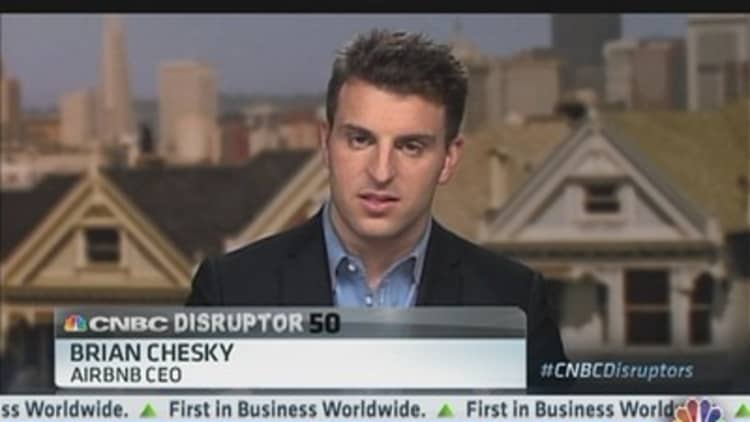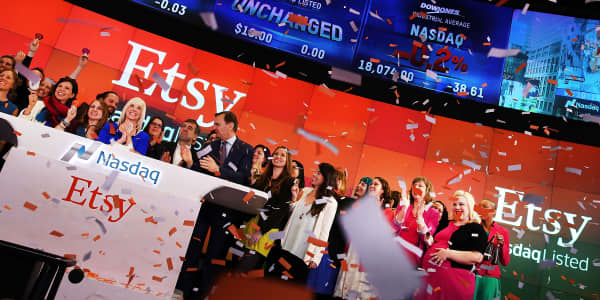The latest news on the CNBC Disruptor50 companies upending the status quo in the markets:
Instagram and Tumblr fleeced?
Forty is the new 30, and 80 is the new 60, and in the land of capitalist milk and honey—otherwise known as Silicon Valley—is $4 billion the new $1 billion?
Pinterest just wrapped up a gargantuan round of funding, $225 million, that values the company at $3.8 billion. For that, Pinterest offers not even a single dollar of revenue, at least not yet. But it has a plan for world domination, and that's all that matters.
When Monsanto bought agricultural algorithm start-up Climate Corp.—founded by Google engineers—for $930 million recently, you could almost hear the screams in Silicon Valley for leaving $70 million on the table and ruining a sure billion-dollar thing for everybody else. It seems the billion-dollar payday given the likes of Instagram, Tumblr and Waze is downright cheap in the app arms race.
Pinterest's latest round was almost double its valuation in a fundraising earlier this year, but at least it's not like investors with a low risk tolerance are exposed to this type of bet: The lead investor was Fidelity Investments, one of the biggest managers of individual investor retirement assets in the U.S.
(Read more: 11 ways your daily routine will never be the same)
Whatsapp in Arabia: Chapter 2
A few weeks ago Whatsapp's website was hacked by a group representing Palestinian political interests. It's also a well-told tale that social media played a significant role in the Arab Spring uprisings. So it's pretty obvious that the powers in the Middle East are paying attention to what "the kids" are downloading and using to communicate.
No surprise, then, that Sheikh Maktoum bin Mohammed bin Rashid Al Maktoum, deputy ruler of Dubai, met with Jan Koum, the typically elusive co-founder and CEO of the world's most downloaded app, this past week.
Koum announced last week that Whatsapp had reached 350 million active monthly users—up 50 million since August. By comparison, Twitter has 230 million active monthly users.
It's possible that the sheikh was seeking some advice on how to hail a private cap by app, as Dubai announced plans to launch its own Uber-like private car app service, according to a report in The Wall Street Journal.
(Read more: The booming business of 3-D printing)
Thom Yorke, we have a new music service for you to hate
You know what I've always thought would be really cool? Pandora or Spotify with actual live footage of the bands playing the streamed music, or at least the videos. I mean, those screen-saver-level graphics on Pandora are barely above an Atari 2600 game level.
Well, for those about to rock, there may be a new Google-backed music service to stream you, in video. YouTube is preparing an on-demand music service—akin to Spotify, but with video—to launch later this year, sources told Billboard.
Like Spotify, it will have free and premium tiers and an unlimited catalog similar to the offering of the All Access subscription music service from Google (YouTube's parent).
(Read more: Why Google's Chromecast isn't an Apple killer ... yet)
Kabam's IPO roadshow?
Free-to-play video game maker Kabam has some big fans (and backers), including Google Ventures. And it's also reportedly readying an IPO. If true, no one could expect it to be valued anywhere near Pinterest—based on Pinterest's zero revenue=high valuation formula.
Kabam is making too much money for its own good. In fact, it just raised its 2013 revenue forecast by about 8 percent, to $325 million, thanks to outperformance of games including "Dragons of Atlantis," CEO Kevin Chou told Reuters.
Another record on Kickstarter—this time, its own
More than 5 million backers and 50,000 projects: Kickstarter is officially the world's leading crowdfunding platform.
Of the more than $837 million total pledged to Kickstarter projects, $718 million has actually made its way from backers' wallets to campaign owners (minus Kickstarter's 5 percent cut, and another 3 percent to 5 percent for Amazon Payments' credit card processing fees), according to a VentureBeat report. Next up: $1 billion in crowdfunded projects served.
The SEC's new rule on crowdfunding should help, if you can get through its almost 600 pages.
The road from dried fruit and beef jerky to eyeglasses
Want to know what it takes to start an eyewear company that becomes an even bigger craze than the one Steve Martin founded in "The Jerk" that drove everyone crazy? Read this interview with Warby Parker co-CEO Neil Blumenthal in The New York Times.
If we didn't end up with $99 designer eyewear, we might have wound up with $99 designer beer jerky. Slim Jim, you've been warned. It's not just Oliver Peoples that can see his monopoly disrupted.
(Read more: Death of the textbook, and the 50-pound bookbag)
Ouya's mea culpa
Gaming console upstart Ouya went quickly from darling to massive mess, and CEO Julie Uhrman has provided a video recitation of all the screw-ups.
"We have done a lot of things wrong. We've made a lot of mistakes, and I think one thing that's really unique about us is that we're going to continue to make them," Uhrman said. Well, that should give Ouya backers confidence.

Sharing economy docudrama
The companies of the sharing economy, from Airbnb to Uber, are among the most wanted capitalists in America. It's probably never been a better time to be a regulator with time on your hands.
Yet the companies know they have to play by the rules once they get big enough—hence, the hiring of lobbyists, funding of studies showing the businesses' positive economic influence and the making of movies.
Al Gore did his climate change film (which in a roundabout way was great marketing for every clean-tech company funded by his VC firm, Kleiner Perkins). Now, car-for-hire company Uber is the subject of a friendly documentary film, the Washington Post reports.
(Read more: Edison's light bulb has a longer life than you might think)
About time Airbnb!
Speaking of playing the capitalist game the old-fashioned way, it's one of the hallmarks of industry marketing to talk up the glow you cast over the economy and then throw out numbers to prove it. (One could literally drown in the ink spilled in recent years over how many millions of jobs and billions of dollars fracking will contribute.)
So it was time for Airbnb to put together a study highlighting its community's positive economic impact in New York, where State Attorney General Eric Schneiderman has subpoenaed data on all 15,000 Airbnb hosts in a bitter legal battle.
By its own (paid survey firm's) count, Airbnb has generated $632 million in economic activity in New York City in one year and supported 4,580 jobs throughout all five boroughs. Nearly 90 percent of Airbnb hosts rent their residence and use the income to help their families get by.
Airbnb guests spend more time and money in New York than typical tourists do. No word if the study counted the sale of illegal drugs like Molly at wild parties hosted in apartments rented by reckless kids or donations from the real estate and hotel lobby generated to Scheiderman's re-election campaign .
Hacking pays
Cyberattack start-up Bromium has doubled its total funding with a round this past week that raised $40 million. Led by Meritech Capital Partners, it brought total funding to $75.7 million.
Bromium's pitch is that fighting malware with traditional fire is a losing battle: It's already won, and the only way to wage and win a new war against cyberattackers is to isolate viruses rather than try to keep them out entirely.
—By Eric Rosenbaum, CNBC.com





